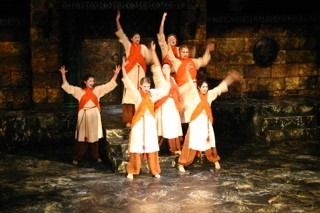Mention Greek tragedy and watch the eyes around you glaze over. Tell them you’ve got front row seats to a new translation of Sophocles’ Electra and watch them furtively dial 9-1-1.
Greek plays focus on the tragic stories of Greek gods (whose names, for the most part, are meaningless to monotheistic Americans). They’re filled with death and human suffering (usually the type that move a movie from PG-13 to R), weeping and wailing, pillaging — you get the picture.
However, this weekend the Gustavus Adolphus College Department of Theatre and Dance is taking on Sophocles’ classic tragedy, Electra. Director Rob Gardner freely admits that he didn’t like the play the first time he read it — most people don’t. He was initially put off by the title character’s constant “moaning and weeping.” However, the more he read and studied it, the more he saw the 2,500-year-old story paralleling events in the world today.
Greek tragedies have been played in theatres the world over for centuries, but many current scripts start from archaic translations. When Gardner heard that a colleague was working on a new translation, he decided this was the play to complete the current season in Anderson Theatre.
Eric Dugdale, assistant professor of classics at Gustavus, has completed his translation of Electra for a new series on Greek theatre for Cambridge University Press. While the imprint from the Cambridge press is not due out until January 2007, the Gustavus Department of Theatre is using this new version, written in contemporary English, as the basis for it’s upcoming production. Dugdale has provided background and interpretations for the cast during rehearsals. “It’s been really great seeing the production take shape,” says Dugdale.
The show, including music written for these performances by composer Michael Croswell and choreography by Maria Gomez Tierney, a visiting assistant professor of dance, opens on May 11 and runs through May 14.
Electra, written while Athens was in the throes of a long and debilitating war, draws its story from the mysteries of mythology in the aftermath of the Trojan War. As Gardner notes, it was “bygone age”: eye-for-an-eye killings were common and the tragic house of Agamemnon was known by all. Rule of law was gaining acceptance for settling disputes, but hatred and revenge were still alive and well.
This cycle of violence is just as familiar to us in the 21st century as it was in the 5th century B.C. As they did more than 2,000 years ago, violence and injustice continue to breed jealousy and revenge. Add a little greed for wealth or power and unwillingness to try to understand another’s religion, and you have the Middle East in flames. Add some ethnic tension and you have genocide in a central African or eastern European nation. Add a weapon of mass destruction and you have a world at war, with all the elements of Sophocles’ Electra.
Dugdale’s translation and Gardner’s vision bring Electra to the Anderson Theatre stage on the Gustavus campus May 11—14. Performances are scheduled each evening at 8 p.m., May 11—13 and at 2 p.m., May 14. Tickets can be reserved in advance by calling the Gustavus Ticket Center at 507-933-7590. Remaining tickets will be on sale at the box office in Anderson Theatre lobby one hour prior to curtain.
